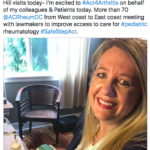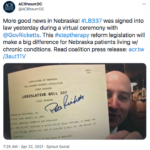 Last week, more than 70 rheumatologists and rheumatology health professionals convened in Washington, D.C., for the ACR’s annual Advocacy Leadership Conference, where they marshaled in support of legislation that would reduce patients’ out-of-pocket drug costs and ensure America’s healthcare workforce is better prepared for future healthcare crises. Attendees included members of the ACR’s Executive Committee, Board of Directors and several policy-related committees.
Last week, more than 70 rheumatologists and rheumatology health professionals convened in Washington, D.C., for the ACR’s annual Advocacy Leadership Conference, where they marshaled in support of legislation that would reduce patients’ out-of-pocket drug costs and ensure America’s healthcare workforce is better prepared for future healthcare crises. Attendees included members of the ACR’s Executive Committee, Board of Directors and several policy-related committees.
The gathering marked the conference’s return to Washington, D.C., for the first time since 2019. The first day, May 11, consisted of committee meetings and advocacy training before remarks by guest speakers Reps. Kim Schrier (D-Wash.) and Mariannette Miller-Meeks (R-Iowa). Both legislators were physicians prior to joining Congress and were able to frame the importance of being involved in advocacy to take part in the policy debates that affect providers and patients.
On May 12, attendees connected with their members of Congress in a mix of in-person and virtual meetings, collectively guiding more than 120 discussions about two important bills that would benefit patient access to care.
- The Help Ensure Lower Patient Copays Act (R. 5801) would prohibit insurers from using copay accumulators to prevent manufacturer cost-sharing assistance from counting toward a patient’s deductible or out-of-pocket maximum. Insurance companies are increasingly using this tactic to shift more of the cost of specialty medications onto patients, essentially allowing them to profit from the cost-sharing assistance patients receive from drug manufacturers.
- The Resident Physician Shortage Reduction Act (R. 2256/S. 834) would help build a robust pipeline of future rheumatologists by increasing the number of Medicare-funded residency positions by 14,000 slots over seven years. At least half of the additional slots added each year are required to go to specialties identified by the U.S. Health Resources & Services Administration as facing a shortage, including rheumatology.
The meetings were tremendously successful, and the ACR has seen movement in Congress and an uptick in co-sponsors for each of the bills discussed. Now it’s your turn: Amplify attendees’ efforts by sending letters to your members of Congress in the Legislative Action Center. It takes only a few minutes to do your part!
If you are interested in participating in future events like these, you can sign up to get the latest updates on the ACR’s Advocates for Arthritis, to which all ACR/ARP members are welcome to apply. Be the first to know when the application period opens this summer.
You can also see more of your colleagues’ experiences on Twitter with the hashtag #Act4Arthritis.


